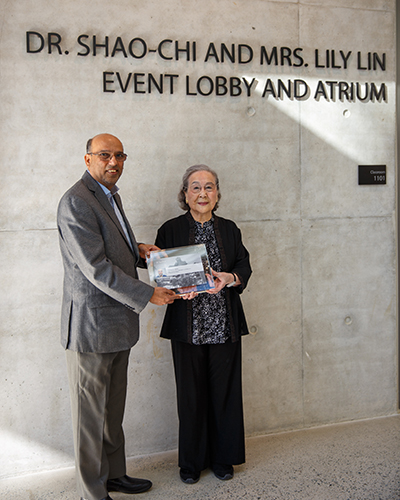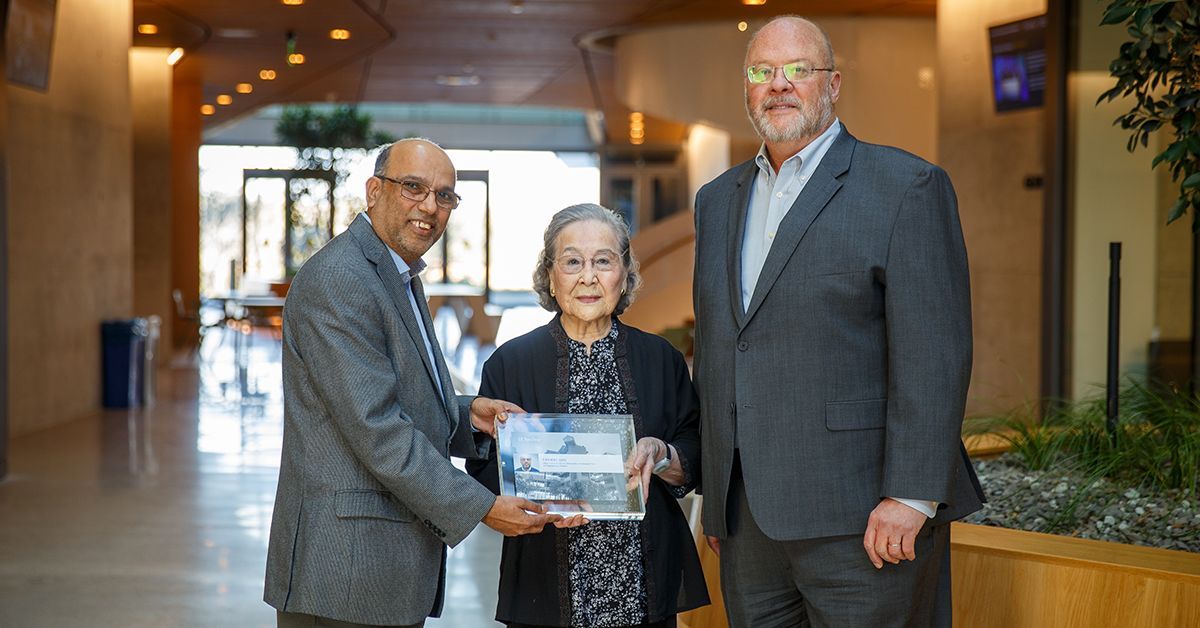Expert in Matter Under Extreme Conditions Named Inaugural Lin Chancellor’s Endowed Chair
Story by:
Published Date
Article Content
Farhat Beg, a professor in the Department of Mechanical and Aerospace Engineering at UC San Diego and a renowned high energy density science expert, has been named the inaugural recipient of the Shao-Chi and Lily Lin Chancellor’s Endowed Chair in Engineering Science.
The Lin Chancellor’s Endowed Chair in Engineering Science was established with a $1 million gift from Lily Lin in honor of her late husband, Jacobs School of Engineering Professor Emeritus Shao-Chi Lin, to support the teaching, research and service activities of a distinguished faculty member in the Department of Mechanical and Aerospace Engineering. An additional $500,000 matching endowment was created as a part of the Chancellor’s Endowed Chair Challenge.
Shao-Chi Lin was an internationally renowned aeronautical engineer who pioneered excimer lasers, and specialized in gas dynamics, with applications in many areas including the re-entry of spacecraft into earth's atmosphere after space travel. He died in October 2020 at the age of 95.
“I would like to finish what Shao-Chi and I started and carry on his legacy,” said Lily Lin. “And for us that legacy is education and research advances that make a positive difference for humanity.”
Beg directs the UC San Diego National Nuclear Security Administration-funded Center of Excellence on Matter Under Extreme Conditions; his high power laser research focuses on the creation of matter under extreme conditions of temperature and pressure, with applications in thermonuclear fusion and extreme ultraviolet (EUV) lithography. One use of EUV lithography is to produce the most advanced and compact semiconductor chips used in many phones, wearables, cars and high-tech equipment today.
“This endowed chair will help me to take my research to the next level,” said Beg. “It is an exciting time if you work on thermonuclear fusion, due to the recent breakthrough of achieving ignition at the National Ignition Facility. However, many challenges need to be addressed in order to use fusion for a limitless energy source, so this award will allow me to bring more students into the program and work on highly rewarding curiosity-driven projects.”
Beg will carry on Lin’s legacy in more ways than one. On the research front, the high power laser matter interactions that Beg is pioneering build on Lin’s expertise in the excimer lasers of the 1970s and 1980s, but under much more extreme conditions. In fact, two of Lin’s former students used their understanding of these lasers, gained in his lab, to found Cymer, which was acquired by ASML in 2013. This San Diego-based company grew to lead the world in the EUV lithography design and manufacture of laser light sources used for making computer chips for computers, phones and many other electronic devices. Beg now partners with ASML to teach a course on EUV lithography, sharing his expertise in lasers and plasma with the next-generation of laser researchers, and shoring up the workforce pipeline.

On a personal level, the Lins and Beg share a similar trajectory. Both Shao-Chi and Lily Lin separately made their way to the United States from China as foreign students in the late 1940s and early 1950s in the hopes of greater opportunity: Shao-Chi to earn a Ph.D. in aerospace engineering from Cornell University, and Lily to study chemistry at the University of Saint Joseph thanks to a scholarship.
Beg’s family moved at the time of partition of India and resettled in Pakistan bringing with them nothing but the clothes on their backs. Yet Beg said his mother was adamant that all six of her children be educated, so thanks to a scholarship he moved to London to earn a doctorate at Imperial College.
“We grew up thinking that education is the most important thing, and even now I find that to be true,” said Lily Lin. “Once you learn, you find that you want to learn more.”
George Tynan, chair of the Department of Mechanical and Aerospace Engineering, said endowed chairs such as the Lin Chancellor’s Endowed Chair in Engineering Science will enable researchers to learn more about ideas and technologies that are hard to even envision now.
“These types of endowed chairs give the recipient the freedom to pursue new ideas that aren't funded by any of the usual mechanisms,” said Tynan. “The faculty member can be more adventurous and try out an idea that is still too early to have data yet. This is like seed funding for new ideas that then, when they do work, grow into something more significant, and can have profound effects.”
This is part of a legacy of giving for the Lin family. In 2012, Shao-Chi and Lily helped to found the 21st Century China Center in the School of Global Policy and Strategy (GPS) at UC San Diego.
 LEARN MORE ABOUT HOW YOU CAN SUPPORT UC SAN DIEGO »
LEARN MORE ABOUT HOW YOU CAN SUPPORT UC SAN DIEGO »
Share This:
You May Also Like
Stay in the Know
Keep up with all the latest from UC San Diego. Subscribe to the newsletter today.




